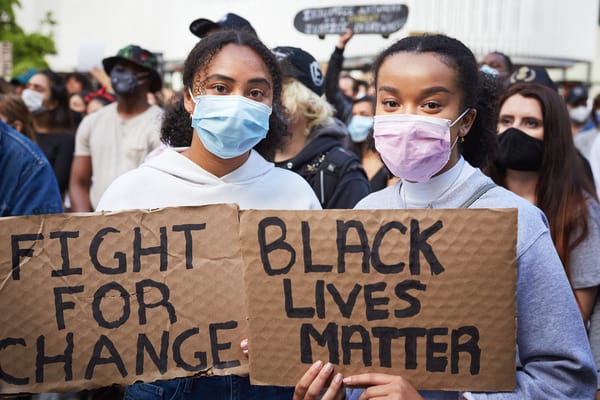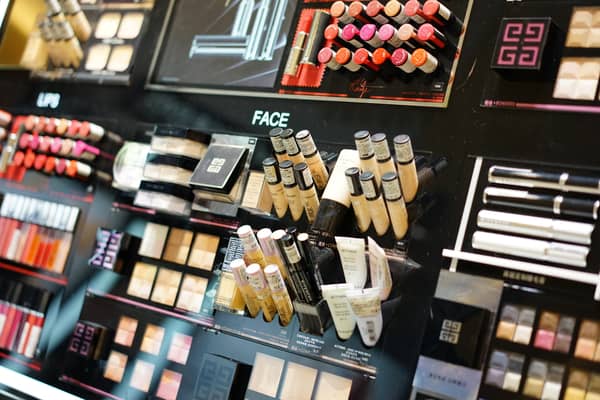#BlackLivesMatter Movement
The tragic death of George Floyd and the BLM protests that followed opened up a much-needed dialogue surrounding systematic racism in all industries across the US. The beauty industry was one of the many industries encouraged to speak out against racism and put forth their plan to break down the barriers to inclusivity.
While calling out police brutality and posting a cursory black square in support of #BlackLivesMatter on Instagram goes so far, many individuals rightfully called out for a deeper change in industries across the US.
The beauty industry needed to acknowledge their own part in systematic racism, whether it be their limited product lines, marketing tactics catering to western beauty standards, or the small percentage of black men and women in positions of leadership.

A Growing Industry
The beauty industry is a growing industry that was worth $93.5 billion in the US market in 2019. Estimates show that the beauty and personal care market will be worth $97.3 billion in 2020. While black people are 13-15% of the US population, they spend more than that proportionally in many beauty categories.
Women in the USA spend around $3,000 on cosmetics and beauty annually. From perfecting their eyebrows to achieving their most beautiful skin, all women would hope to be represented in the products.

Limited Product Lines
When Fenty released a beauty range of forty-plus shades of foundation in 2017, it was one of the first mainstream brands to really cater to darker skin tones. A beauty line that catered to all skin colors in 2017 was considered groundbreaking, which tells you everything you need to know about issues in the beauty industry.
While other beauty brands have released extensive shades in their foundations, these collections focused on lighter shades. Millions of black women were unable to find anything remotely close to their skin color, and instead had to rely on picking between one or two generic shades which would neither match nor compliment their skin tones.

Standards of Beauty
It is clear that the majority of beauty brands cater solely to the western cultural standards of beauty, disregarding the billions of consumers who do not fit into a Caucasian standard of beauty. For many black women, poker-straight hair is unachievable, as are many other predominantly white features.
Understandably, Unilever received backlash in June from the marketing of their skin whitening product, “Fair & Lovely” which is sold in countries such as India, Indonesia, Thailand, and Pakistan. Despite the outrage, Unilever did not remove the controversial product. Instead, Unilever renamed the product “Glow & Lovely”, completely disregarding their part in promoting lighter skin tones as a beauty ideal.
It seems categorical that makeup is there to accentuate features and encourage women to embrace their natural features. Instead, many beauty brands would prefer to benefit from internalized racism and women’s insecurities.
#PullUpForChange Movement: More Than Beautiful Skin
Not only is the way beauty brands market their beauty campaigns and the limited range of products for all skin colors a barrier to inclusion. Discrimination in the beauty industry goes even deeper.
Sharon Chuter, owner of beauty brand Uoma, called out brands to reveal the percentage of black and minority employees they had at the corporate level within 72 hours. Sharon began the movement #PullupForChange to encourage transparency from brands about their leadership and to hold brands accountable for their own biases.
The Instagram account @pullupforchange now has 133k followers and has heard back from many global brands about the breakdown of their corporate positions, including Sephora, Revlon, and L’Oreal. At Sephora, black employees make up just 6 percent of leadership roles. Similarly, at Revlon, there is 5 percent at the director level and above. L’Oreal employs 8 percent of black employees at the executive level. Perhaps even more shockingly, there are no black employees that hold leadership employees at Glossier, and no black employees at Lime Crime’s corporate headquarters at all.

While the transparency of these brands is commendable, simply acknowledging their lack of diversity in leadership roles is not enough. Companies must take action by hiring black employees at the executive level. Only once this issue is rectified will the effects trickle down to inclusive product lines and marketing campaigns for all.


